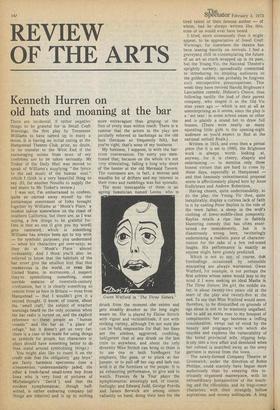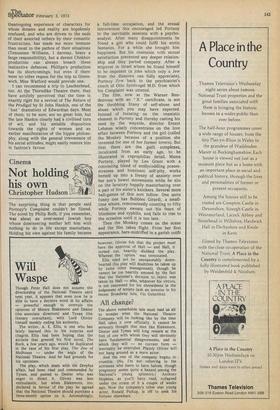Kenneth Hurren on old hats and moaning at the bar
There are incidental, if rather negative things to be grateful for in Small Craft Warnings, the first play by Tennessee Williams to have turned up in many a moon. It is having an initial outing at the Hampstead Theatre Club, prior, no doubt,. to its transfer to the West End, if the encouraging noises from most of my confreres are to be taken seriously. Mr Tinker of the Daily Mail was moved to speak of Williams's supplying " the lyrics to the sad music of the human soul," which I think is a very beautiful thing to say. (0, for another Novello to supply the sad music to Mr Tinker's review.)
I was not, I'm embarrassed to confess, quite so carried away myself by the picturesque assortment of folks brought together by Williams at ' Monk's Place,' a modest saloon somewhere on the coast of southern California; but there are, as I was saying, a few things to be grateful for. One is that no one (I give you my word) gets castrated,. which is something Williams has always been apt to toy with — for symbolic purposes, you understand
— when his characters get over-sexy; as they do at 'Monk's Place' almost incessantly. And I think you'll also be relieved to know that the habitués of the bar never give the smallest hint that this rendezvous is the world, or even the United States, in microcosm. .I suspect they're symbolising something, some terrible malaise of twentieth-century civilisation, but it is clearly something so remote from us here in Britain — even from Hampstead — that I wouldn't give it a second, thought. (I know, of course, about the ' small craft,' the subject of weather warnings heard on the only occasion when the bar radio is turned on, and the explicit reference to these' people as " human vessels " and the bar as " a place of refuge," but it doesn't get us very far: there is a case to be made for using things as symbols for people, but characters in plays should have something better to do than stand around symbolising things.)
You might also like to count it on the credit side that the obligatory 'gay boys ' are fairly harmless specimens (one a screenwriter, understandably jaded; the other a fresh-faced small-town boy from Iowa who is very fond of pictures of Michelangelo's ' David '), and that the resident nymphomaniac, though half witted, is rather endearing company (all things are relative) and is up to nothing more extravagant than groping at the flies of every man within reach. There is a rumour that the actors in the play are jocularly referred to backstage as the old hats (because so frequently felt), but you're right, that's none of my business.
My business, I suppose, is with the barroom conversation. I'm sorry you mentioned that; because on the whole it's not very stimulating, falling a long way short of the banter at the old Mermaid Tavern. The customers are, in fact, a morose and maudlin lot of drifters and my interest in their rows and ramblings was but sporadic.
The most inescapable of them is an ageing beautician named Leona, who is
drunk from the moment she enters and gets steadily drunker as the long night wears on. She is played by Elaine Stritch with vigour and verisimilitude, if not with striking variety, although I'm not sure she can be held responsible for that: her lines are the aimless, aggrieved, confiding, belligerent chat of any drunk on the last train to anywhere, and about the only diversity Miss Stritch can bring to them is to use one or both forefingers for emphasis, like guns, or to pluck at her jumper, or to pull off her cap and lash out with it at the furniture or the people. It is an exhausting performance, to give and to watch. Frances de la Tour plays the nymphomaniac amusingly and, of course, feelingly; and Edward Judd, George Pravda and James Berwick are among others valiantly on hand, doing their best for the
tired talent of their famous author — of whom, had he always written like this, none of us would ever have heard.
I tried, more strenuously than it might appear, to be appreciative of Small Craft Warnings, for elsewhere the theatre has been leaning heavily on revivals. I feel a graveyard chill in contemplating the future of an art so much wrapped up in its past, but the Young Vic, the National Theatre's sprightly nursery, sporadically committed to introducing its stripling audiences tO the golden oldies, can probably be forgiven such retrospective preoccupations. This week they have revived Harold. Brighouse's Lancashire comedy, Hobson's Choice, thus following tardily the lead of their parent company, who staged it at the Old Vic nine years ago — which is not at all as unenterprising as it seems, since the play is a 'set text' in some school exam or other and is plainly a sound bet to draw full houses. (There were nearly as many squealing little girls in the opening-night audience as you'd expect to find at the national netball finals.)
Written in 1915, and even then a period piece (for it is set in 1880), the Brighouse work is always worth looking at, anyway, for it is cheery, shapely and entertaining — to mention only three honest virtues that are hard to come by these days, especially at Hampstead — and that famously unsentimental proposal scene is affectionately played here by Anne Stallybrass and Andrew Robertson.
Having chosen, quite understandably, to do the play, the Young Vic then, quite inexplicably, display a curious lack of faith in it by casting Peter Bayliss in the role of the stern father, a sheep in the wolf's clothing of lower-middle-class pomposity. Bayliss retails a ripe line in flabbily blustering comedy that has often entertained me 'immoderately, but it is disastrously wrong here, twitteringly undermining a realistic piece of characterisation for the sake of a few red-nosed laughs. His performance is exactly as anyone might have glumly predicted,.
Which is not to say, of course, that forebodings occasioned by ostensible miscasting are always warranted. Gwen Watford, for example, is not perhaps the first actress whose name would leap to my mind if I were seeking an ideal Masha in The Three Sisters: the girl, the middle sister, is about twenty-two years old at the start of the play and twenty-five at the end. To say that Miss Watford would seem, therefore, to be disqualified on grounds of age alone is not to be wantonly ungallant, but to add an extra rose to my bouquet of compliments: her age becomes a trifling consideration, swept out of mind by the beauty and poignancy with which she touches and explores the vulnerability of the bored provincial wife, slipping helplessly into a love affair and desolated when her colonel is snatched away as the army garrison is moved from the town.
The newly-formed Company Theatre at Greenwich, under the direction of Robin Phillips, could scarcely have begun more audaciously than by essaying this intricately organised masterpiece, with its extraordinary juxtaposition of the touching and the ridiculous, and its tragi-comic characters with their strangely hollow aspirations and moony soliloquies. A long theatregoing experience of characters for whom dreams and reality are hopelessly confused, and who are driven to the ends of their assorted tethers by their romantic frustrations, has made me more immune than most to the pathos of their situations (Tennessee Williams, I daresay, bears a large responsibility), but a decent Chekhov production can always breach these instinctive defences. Phillips's production has its shortcomings, but even if there were no other reason for the trip to Greenwich, Miss Watford would provide one.
I can recommend a trip to Leatherhead, too. At the Thorndike Theatre there, they have astutely perceived that the time is exactly right for a revival of The Return of the Prodigal by St John Hankin, one of the ' lost ' dramatists of Edwardian days. Most of them, to be sure, are no great loss, but the late Hankin clearly had, a civilised turn of wit, and his amiable disposition towards the rights of women and an earlier manifestation of the hippie philosophy, along with the general irreverence of his social attitudes, might easily restore him in fashion's favour.



































 Previous page
Previous page